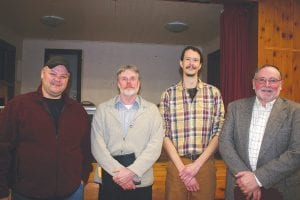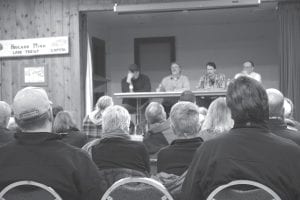Four candidates running for the open District 1 Cook County commissioner seat met at the Hovland Town hall on Monday, March 13 and were asked a series of questions in front of more than 70 people. All of them came prepared and will give District 1 voters a good choice to pick as a representative for the east end of the county. A primary special election will be held April 4, 2017 and the general special election will follow on June 6. From L-R: Bobby Deschampe, Dave Keller, Ryan Bottger and Jim Vannet.

Hovland Town Hall was the epicenter of East End politics on Monday, March 13, as more than 70 residents turned out to hear from the four candidates running for the one and one-half year that will remain on the District 1 Cook County commissioner seat vacated by Frank Moe, who left for health reasons.
The forum was held on a cold night, and the heat had to be turned off so the candidates could be heard instead of the heater.
Candidates Jim Vannet, Ryan Bottger, David Keller and Bobby Deschampe were asked questions by Arvis Thompson, who served as moderator. The questions came from the audience or were sent in via email. Candidates were allowed two minutes to answer questions.
Thompson asked each candidate to tell the audience why they were running for office.
In short, Vannet, who has a significant background in business, felt the county should be more fiscally responsible for the way it spends money. He said he wasn’t afraid to speak up when he opposed something and added, “I’m not scared to fight for anybody’s rights.”

A spirited debate was held with the four gentlemen pictured here who are vying to fill the District 1 Cook County commissioner’s seat that opened up when Frank Moe left office to take care of his health. The debate was held at the Hovland Town Hall on Monday, March 13.
“I see a lack of balance of viewpoints on the county board,” said Bottger. “Opposing views and creative voices are being ignored. I think we can do better than that.”
After attending several commissioner meetings and complaining to his wife about the county’s budget process—or getting up on his soapbox—as Dave Keller said, “My wife told me to stop talking about it and do something about it.”
Keller has a background in business that included working with state, federal and county government in the Twin Cities, and he felt his work experience would be beneficial in a commissioner job.
“Grand Portage needs a strong voice,” said Bobby Deschampe. “We haven’t had a voice for 30 years since Bill Corcoran served as a county commissioner. I have lived on and off the reservation. I work as a construction manager, and I feel I would make a good representative for District 1.”
When asked, “How do you understand the role, function, and purpose of the EDA. How would you plan to work with the EDA?” the responses were lively.
“I guess you all know that I’m not the best friend of the EDA,” Vannet said. And he cited EDA’s hiring consultants who advised in the development of workforce housing for the county. “Did they follow the consultant’s recommendations when it comes to building workforce housing, and where that housing will be built? No. Why hire consultants if you are not going to listen to them?” he asked rhetorically. Vannet also said he didn’t feel the county’s tax levy investment in the EDA resulted in a safe return to the public on that investment.
“I have come to understand that the EDA board is made up of well-intended people,” said Bottger. “They are very well aware of their past. As far as the board goes, a lot of what they do is thinking inside of the box. They come up with typical solutions… They need to look outside of that box for some answers.”
“What was the EDA’s plan with developing the business park?” said Keller. “I’m not sure they had a long term plan or a complete plan for the business park.” Keller also stated that he wasn’t’ necessarily against the EDA/One Roof Housing Lutsen housing project, but thought it might be funded differently.
“I have been told the EDA plans to approach Grand Portage and discuss housing,” Deschampe said. “I hope they have a plan. Hopefully not like the one they have for Lutsen where rent is $1,100 per month. We don’t need that plan. I also told them they should sell their golf course.”
Residents of Grand Portage make up the largest portion of the population in your district. What do you know about the needs of the community?
“I’m not sure the needs of Grand Portage differ much from the rest of the county,” Keller said. “There are affordable housing issues, livable wage issues, school issues, roads… in general, they face the same issues we face. We need to work together to solve our problems, and I’m not sure that’s been happening.”
“I think District 1 is unique. Grand Portage is a sovereign nation,” said Deschampe. “People in Grand Portage feel like there is a curtain between the reservation and the county. We have 60-plus jobs open on a daily basis, but we don’t have enough housing for employees to fill those jobs. The biggest thing for us is to be recognized by the county.”
“I would like to meet with the chairman and the elders and ask them what they feel the county needs to do to help,” Vannet said. “There are cultural and historical differences that must be honored. If we are going to build the economy in the county, then we can start with the 60 jobs that aren’t being filled.”
“A lot of similarities to public workforce housing the county is experiencing is happening in Grand Portage,” Bottger said. “I would like to meet with the elders, maybe have a public hearing at the Community Center, and discuss what their needs are. I think the county can take notes from Grand Portage on some of their projects like the Community Center they built. As far as the Mineral Center Road, it is ridiculous. You can barely call it a road. But I do know that it is in the works to be fixed.”
On county discretionary funding, Deshampe said, “Those are real hard decisions to make. Sometimes the money isn’t there. You have to say no. Pick and choose, but you can say no.”
“What is the return on investment? Bottger asked. “Not just the financial return, but the quality of life return. And, is there another place that money can be found? We need to look at that.”
“You need quantifiable data to support why you are giving money away,” Vannet said. “Bob is right. You can say no.”
“You need to look at the big picture, your current financial year,” said Keller. “We need to know what we are getting back for our investment. We must be responsible and make decisions based on our financial viability.”
What is your opinion of the YMCA and its support from the county?
“Oddly enough they built it in the middle of the winter when construction costs are high,” Keller said. “It’s proven to be something of a red herring. The county is into it for half a million dollars, and it’s only a couple of years old.”
“I don’t know much about the YMCA,” Deschampe said. “They could have come and talked to us before they built it. We built our Community Center in the 1990s, and there is nothing wrong with it. We could have helped them figure out the costs if they would have asked us.”
“My opinion differs,” Bottger said. “But yes, we should have taken notes from Grand Portage.
“The Y serves a need for many in the county. There are afterschool programs for kids, and it provides childcare for people who might not be able to find childcare. It also costs about half of what we were paying for the old pool, which was bleeding money.”
“One of the commissioners (Doo-Kirk) tried to validate the need of the YMCA by stating that 30 new jobs were created in the county,” said Vannet. “If you take the annual salary payments, each employee would receive an average of $16,666 per year. If they all had property in the county and paid $700 per year in taxes, they would generate $21,000 per year in tax revenue. This means that the county spends $145,000 per year plus the initial investment of over $10,000,000 to generate $21,000 in taxes. Even with employee expenditures in town businesses, it is still a losing proposition.”
There were more questions, too many to list here. After the forum candidates met with the public to mingle and discuss the topics in more detail. All in all, it was a good, informative meeting.


Leave a Reply